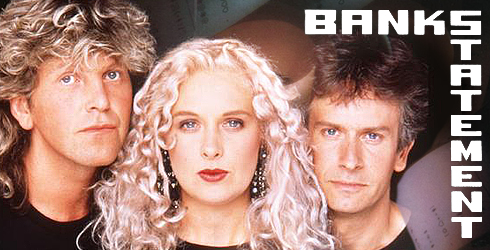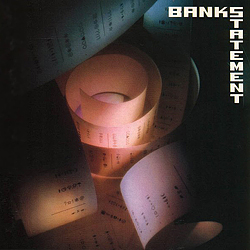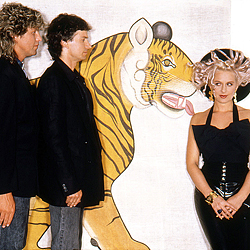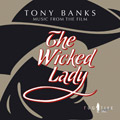


Tony Banks was the second member of Genesis after Steve Hackett to begin a solo career. When A Curious Feeling (1979) with a lead singer and The Fugitive (1983) with Banks singing himself more or less tanked he switched his focus to film scores. In 1988 he began recording a new album. This time he followed the example his band mates had set and did not use his own name but put together a (quasi) band formation called Bankstatement. Michael Rutherford had planted a tiny hint at his person in the band name Mike & The Mechanics, now Banks tried the same, though one may wonder whether it was a clever pun. After all, it is either the bank statement or, you can read it differently as Banks' statement, as in Tony Banks makes a statement.
 The album, which came out in August 1989, was coproduced by Tony Banks and none other than Steve Hillage, a prog and psychedelia guru of the 1970s. Hillage was known for his work with Gong and particularly for the legendary, weird album L (1976); he had switched to producing albums and provided some guitar parts for the record. The self-titled debut album that would, incidentally, remain the only Bankstatement album, was a well-produced pop record without any rough edges. All the songs on it were written by Tony Banks.
The album, which came out in August 1989, was coproduced by Tony Banks and none other than Steve Hillage, a prog and psychedelia guru of the 1970s. Hillage was known for his work with Gong and particularly for the legendary, weird album L (1976); he had switched to producing albums and provided some guitar parts for the record. The self-titled debut album that would, incidentally, remain the only Bankstatement album, was a well-produced pop record without any rough edges. All the songs on it were written by Tony Banks.
At the core of Bankstatement there were three lead singers, Alistair Gordon, Jayney Klimek and Tony Banks himself. Wherever Bankstatement appeared (the band name would also be written in two words in places) these three were the front people – on the album back cover, in the Throwback video or in TV performances such as I'll Be Waiting on British morning TV programmes. Other musicians include renowned session musicians such as Pino Balladino on bass or the Phantoms Horns led by their saxophone player Gary Barnacle. .
Throwback 4:39
The first track begins with a horn flourish – is that the statement? This is the only time the Phantom Horns are used, though Tony Banks feels he needs to support them with synth brass sounds. It is a nod to Phil Collins' massive use of brass groups, but it also works very well in this midtempo song that has a fine sound. Alistair Gordon's vocals start off very well, but he kind of stays at half-throttle throughout. He could have been better. The song has a fairly traditional structure, but the performance is alright; one is reminded of Home By The Sea or I Missed Again in places. The lyrics are a tad pessimistic as the narrator describes himself as an outsider, a personified throwback who cannot cope with life. There is no particular excitement to the track, everything stays on track, speed and rhythm from the beginning to the end. Still, a good beginning and a song with radio potential..
I'll Be Waiting 5:56
A sort of sampled choking choir in best 1980s fashion with very contemporary drum computer beats follows. Alistair Gordon's voice fits this sugary ballad, while Klimek helps out with the backing vocals in the chorus. Tony Banks briefly plays his beloved Yamaha CP-70 E-piano, and some of the sounds in the chorus sound a bit like Tonight Tonight Tonight. The song flows calmly down the river. It is quite a bit too long because of the lack of surprises in it.
Queen Of Darkness 4:26
Here we go! This is actually nothing but a version of Lorca from the Redwing Suite with vocals. Banks wrote the original for the score for Lorca And The Outlaws, which was published on the Soundtracks sampler. The musicians play much stronger here, though, and Jayney Klimek has the proper timbre for such a dark track. The drums finally have power, too; it would only take a couple of distorted guitars to make this a proper rock song. One of the most consistent songs that grows into something even more dramatic by a big climax in the middle.
That Night 4:41
A ballad again. Another gentle sound that is so typical for 1980's Banks. One is about to forget the song when suddenly everything is reduced to Alistair Gordon's fragile voice, a tambourine and the CP70 piano. After this intimate verse Genesis-like bombast flows over us, and Jayney Klimek consoles us with a gently sung chorus. This is where the combination of male and female voice pays off this really helps convey the message of the lyrics („rest your weary head with mine, I'll take you through the night...“. As far as that is concerned there are reminiscences (content-wise, not musically) of Peter Gabriel's duet with Kate Bush in Don't Give Up. It is a song where a woman encourages her broken man. When both voices meet and join towards the end you can really get into this schmaltz.
Raincloud 4:40
One of the harmless pop songs Banks got known for during his career. The message is not all that different from the previous track. Though there may be rainclouds in your private life do not hang your head. Well. Tony Banks chooses a peculiar sampled guitar sound, some chord changes and the keyboard sounds remind of his work in Genesis. The percussion adds some colour to the song.
 The Border 5:52
The Border 5:52
Wf this pop album has any traces of prop rock they will be most likely found in this massive track that used to start off the second side of the LP or MC. And it works that way. Synth arpeggios and thundering piano bass sounds and Alistair Gordon's voice add drama to the beginning before one of the sound walls we know from Genesis engulfs us. There are many changes in rhythm and dynamism, even though it is basically just the same pattern repeated a couple of times. This does not get boring so soon. One does note Gordon's vocal limits, though; he can put feeling into his performance, but he seems to lack the ability to add nuances to it. Still, this is the top track on the album, close to the poprock typical for the Genesis of the 80s and 90s. And finally - no fadeout!
Big Man 4:16
This is where Mr Banks himself does the singing. At first, though, it feels like a strangely droning closing section of The Musical Box. A mellotron-like sound sets us on the wrong track for what follows is an oddly flat pop song with a brisk rhythm but no working melody anywhere. Banks is quite able to sing certain songs very well, but here it seems as if the melody was made to fit his limited vocal range. Banks also brings back that dratted synth guitar.
A House Needs A Roof 4:07
That sampled guitar also introduces the next song, a straightforward pop number. Jayney Klimek tries her best, but with a composition this short of surprises she cannot turn it into anything more than a nice pop song. One is given to wonder why Tony Banks, who has created all those enormous and grandiose prog feats, seems contented with such a simple song structure. For the first time there is something like a brief keyboard solo, though it more or less vanished with an indistinct sound in the echo. It is a song you can easily listen to while you are doing other things.
The More I Hide It 4:30
In the reviewer's opinion this is the best and most emotional pop song on the whole album. A simple piano riff and an intimate arrangement in the beginning make Alistair Gordon's voice shine. When the full band comes in it grows logically out of the beginning; the move into the first chorus is classic. Lyrically the song is about the disappointed lover crying after a woman who does not requite his feelings or understand him. The songs conveys the emotion, Gordon's heartache is believable, and right before the second chorus the surprise – a brief bit of solo saxophone. This song illustrates that a song structure that is not exactly revolutionary can nevertheless be fun and entertaining. The brief stop before the second chorus, the fact that there are two choruses and the fine performance prove that simple need not be bad.
Diamonds Aren't So Hard (CD bonus track) 5:12
CD bonus tracks! Those were the times when not everything fit on an LP and people needed an incentive to buy the new media. The reviewer's first version of Bankstatement was the LP, so he got to know this song only later. It is another one from the stack of seemingly naive harmless Banks songs, yet one of the more interesting ones. The changes in rhythm count for something even though it all stays in simple 4/4. Even a brief sax solo – neat.
Though he fervently hopes for it the reviewer it not quite sure whether Banks attempted a parody with these lyrics or not: „Come with me / where dragons rule the air / and diamonds aren't so hard to find / And come what may / heroes never fail / and time stands still / no matter if you're young or old“...
Thursday The Twelfth 4:48
A Genesis tradition says hello: An instrumental is at the end of the album. This is approximately Tony Banks' version of Led Zeppelin's legendary track Kashmir. At least this is what the powerful drums that sound like Bonham or Collins (your choice) and the oriental string sounds hint at. There even is a real electric guitar, how about that! It does not do too much, though, because the keyboards rule supreme, as always with Banks. Interweaving string melodies are supplanted by chord blocks. There is something like a hookline at the end. The drumfills and the keyboard sounds make you think of the things he did with Genesis, particularly the ending of the slowly fading song. Not Tony Banks' best instrumental, but certainly not his worst either.
The overall impression is mixed. There are some highlights on the album, especially The Border and The More I Hide It. After that there are some good and some mediocre songs. Banks too often relies on repetitive structures and (sometimes exceedingly) dull lyrics to do the trick. The sound is still firmly rooted in the 80s, though the drum sounds reveal that it has been recorded near the end of the decade. Some songs like Throwback and That Night have radio potential. The video for Throwback and an accompanying home story were shown on the German music TV programme Formel Eins, which was a must-see back then. Some tracks could have done with a little bit more work on them. But then the band concept has not been done all the way through. The musicians on Bankstatement have not become a full band. The proof is in the fact that the next solo record, for Bankstatement is nothing else, appeared under Tony's own name again though the concept of Still is not that different from Bankstatement.
What this record lacks, in the end, is variety and catchy tunes. Much on it is too random, and malicious tongues could claim that the more exciting tracks like The Border and Thursday The Twelfth do not actually fit in on the album, at least if you surmise that the songs were more or less aimed for the single charts. Even though Gordon sings most of the lead vocals the changing lead vocalists (a change which is an asset for the album) and the uncertainty who the band leader is may have contributed to the problem that Bankstatement is not quite identifiable.
by Jan Hecker-Stampehl, English by Martin Klinkhardt



Rerelease of the original soundtrack plus some extra tracks. Due 15th April 2013.